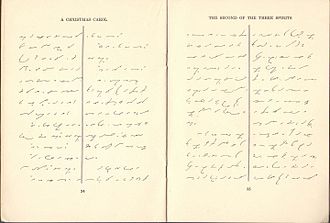I was recently doing some research on a professor I was about to interview. In addition to his online biography and CV, he had a website. However, when I clicked on the “Blog” tab to get a sense of his personality, I found he had written simply, “I’m not much of a blogger.”
That made me laugh out loud. I’m not sure if I am much of a blogger since this is my first attempt at sharing such personal expression since I wrote a diary in high school.
However, I decided I am willing to share few thoughts to share about life and writing.
I’ll start with one of my most useful writing and research tools – and no, it’s not ChatGPT. (More about that another time).
One day when I was interviewing a college student for an article, she peered down with interest at my notes.
“Oh, you know Arabic,” she said.
No, it wasn’t Arabic. It was Gregg Shorthand.
It was then that I realized I possessed a somewhat arcane skill that baffles most people who see me using it.
How I became a half-baked expert in Gregg Shorthand is the very definition of serendipity.
Coming into my senior year of high school, I was trying to sign up for Drivers Ed since learning to drive was the dream of every 17-year-old, even those of us who didn’t have a car of our own. Somehow our primitive computer system slotted me into Shorthand 1 instead. Once the nun in charge had me in her class, there was no escape. She told me the skill might be helpful, even though I was in the “college-bound” track rather than the “secretarial/business” track in high school.
Even though I didn’t become proficient enough at it to actually get a stenographer-type job, I did learn enough to help with taking notes in college. Then, lo and behold, I ended up majoring in journalism and becoming a reporter.
My Gregg shorthand served me well in the copious note taking involved in interviewing thousands of people over the years. Gregg’s “brief forms,” quick loops and swirls and phonetic system helped me get the gist of a conversation, even though I still had to write out words like serendipity and supercalifragilisticexpialidocious.
Of course, like most journalists I’ve added a tape recorder or phone recording app to my toolkit, but my trusty Gregg shorthand helped me gather and draft the bones of the story, adding exact quotes as needed from the recording.
And, of course, it was a great backup on the rare occasions when technology failed me – like when the battery failed or the recordings folder was filled to overflowing.
Increasingly, over the years, though, people began looking at me strangely, baffled by my cryptic notes or guessing I was writing in some strange foreign language. I realized shorthand was becoming a lost art.
With a little Internet research, I found Gregg Shorthand and its cousin Pitman Shorthand were both being left behind by technology. Stenographers generally disappeared decades ago along with manual typewriters. Business people, academics and executives began to type out their own letters and memos on their laptops or at least dictate them for someone else to input into the computer.
I also found out, in diving into online research that John Robert Gregg invented his form of shorthand it in 1888, almost fifty years after Pitman shorthand was invented, and it is much harder to learn than Pitman. (This information will come in really handy when I am on Jeopardy).
According to the Gregg website – and there are several websites and online groups – Gregg shorthand is primarily favored in the United States, and the Spanish adaptation is also commonly used in Latin America while Pitman is the shorthand of choice in Europe.
The Internet also promised that Gregg shorthand is an incredibly efficient system; dictionaries, textbooks, apps and websites for learning it still exist, and, with practice I could get up to speeds of 200 words a minute.
I also found some samples of documents and stories written in Gregg Shorthand. So I will close this blog with a timely, holiday-related writing sample for your enjoyment.
As you can see, shorthand is an important system that will continue to be used in the future.

